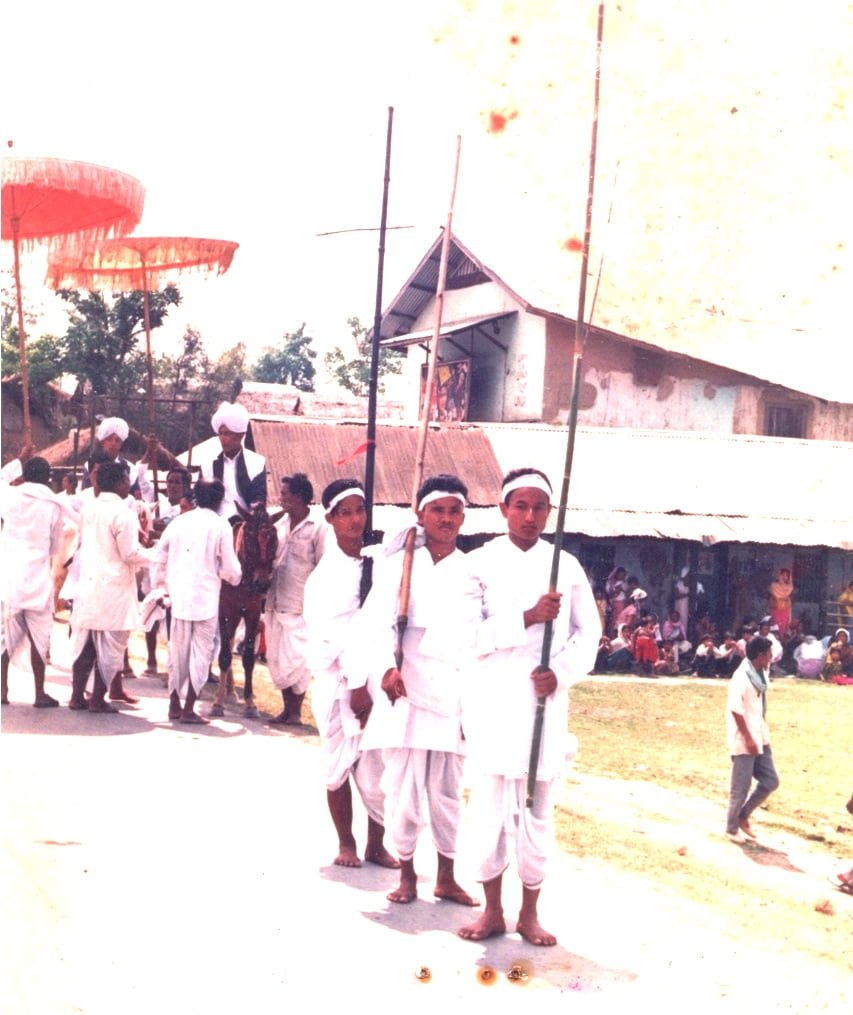The traditional rights of Laisha Tanba or Laisha Tamba of Waikhong village to Ima Thumkhong Lairembi and Ibudhou Apokpa is an important ritual. This ritual is also performed among other Loi villages of Phayeng, Andro and Kakching, etc.
The Laisha Tanba signifies that these Loi villages of Waikhong, Phayeng, and Andro are the sole owner of the forest and hills surrounding them. The Waikhong people used to hunt in the forest situated in the hills which lie on the western part of Phandu peak – the Leihaopokpi, Leiripokpi, Chandolpokpi etc. And crossing the Indo Burma Sugnu road, the villagers used to hunt wild animals in the hills touching Pumlen pat – Maning ching, Ibudhou Pakhangba kolu etc.
The valley foothills are the abode of the Meitei deity. And the villagers are their caretakers. We must protect the Laifamlen and the traditional rights of valley people who are dwellings in the foothills of Waikhong, Phayeng, Andro, etc.
The Laisha Tanba of Waikhong is performed during the month of Kalen, during the Lai Haraoba ceremony of Ima Thumkhong Lairembi and Ibudhou Apokpa. There are two Laibung (temples) of the Village diety – one in Ningthoumanai and another in Laimanai which consist of five sub-leikai. The responsibility of Lai Haraoba in Waikhong is given to these two Leikai for a period of two years each.
When the Ningthoumanai villagers perform Lai Haraoba of Ima Thumkhong Lairembi in the first year, they will perform the same rituals of Ibudhou Apopka in the next year. Thereafter, the Lamanai people again performed the Lai Haraoba for both diety in their Laibung.
The rituals of Laisha Tanba were performed in Waikhong to protect the villagers from any misfortunes and miseries. It was an important event for Waikhong villagers. The Khullakpa (Village head) organized the event along with their Phamdou (Traditional institution). This sacred ritual is performed a few days after the commencement of Lai Haraoba on an auspicious day.

On this day, the Khullakpa along with his Phamdou rode a horse which was led by women who are carrying athenpot (vegetables, fruits, and flowers) to be offered to the Khullakpa. The Ningthoumanai Khullakpa went to the Kangjeibung near the Thenga ching on the western side of the Waikhong village. Almost every member of Waikhong (both Laimanai and Ningthoumanai villagers) participated in the Laisha Tanba rituals. They used spears and swords while hunting. When it was the turn of Laimanai Khullakpa, the hunting was performed around the Leiripokpi hills on the eastern side of the Indo Burma Sugnu road, adjacent to the Aihang village.
Wild boars, Golden cats, Chinese pangolin, and deer were often hunted during the Laisha Tanba rituals of Waikhong. The news of animals caught is informed to the Khullakpa by a messenger and those who caught animals are rewarded. Hijam Thanghaiba Meitei of Chingdong Leikai informed that he was rewarded with three Khudei and a cash prize of Rs 100 by the Khullakpa for catching an animal in 1996.
The hunted animals are brought to the Laibung of Ima Thumkhong Lairembi and the Amaiba Amaibi performed Saren Chanba to the Deity, seeking blessings for the well-being of the villagers.
This ritual is a living proof that valley people living at the foothills have had their own traditional rights in the forest since time immemorial. The Laisha Tanba or Laisha Tamba rituals of Andro hunt only on deers while the Laisha Tanba of Kakching is performed on Eel hunting. And the Laisha Tanba of Phayeng village is somewhat similar to that of Waikhong.
The Laisha Tamba or Laisha Katpa of Phayeng is performed on an auspicious day of Phairen month. The villagers performed the rituals on the hills surrounding the Laifamlen of Chingshang Ningthou and Irok Leima. Before the start of Laisha Tanba, an offering is made in front of the Diety for the safety of the hunters and for the good catch. The common belief for the Phayeng is that this ritual is performed for the safety of the villagers.
In addition to this Laisha Tanba rituals, the Waikhong villagers performed another important traditional right known as Lei Thiba. During the Lai Haraoba of Ibudhou Apokpa, villagers went out to the forest in search of Thangtup (Dwarf date palm) seed and fruits, Chumnang Lei, Kombirei, and Kongyanglei. These are offered to Ibudhou Apopka for the prosperity in their life.
Thus, the traditional rights of these valley foothills settlers must be protected if we want to preserve the indigenous religion and people. The customary practices of Laisha Tanba and Lei thiba of Waikhong shows that Meitei living along the foothills of the Valley forest cannot be separated from the forest. The forest and hills surrounding Waikhong must be protected for the preservation of Meitei religion.
Naorem Mohen is the Editor of Signpost News. Explore his views and opinion on X: @laimacha.
1 thought on “Laisha Tanba – traditional rights of foothill villages”
Comments are closed.

[…] called Laisha Tanba (hunting animals for the diety). The Village khullakpa used to go out hunting (Laisha Tanba) sitting on a horse along with his Phamdous (traditional institutions). Whole villagers […]